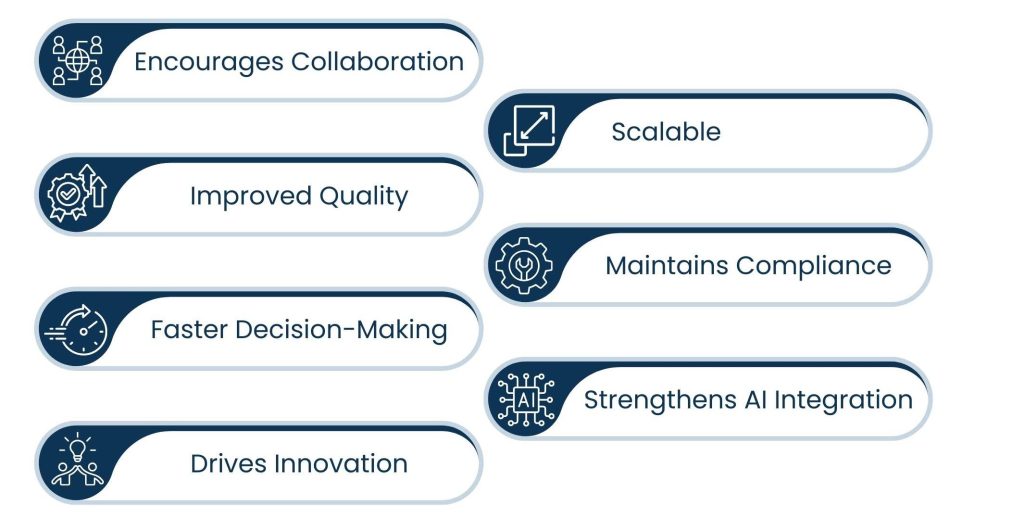Introduction
Data strategy services are no longer a tech luxury, but a core business necessity. Indeed, in the digital era, the key difference between becoming an agile and long-lasting company and going the other way is a company’s ability to capture, interpret, and act on data. The companies that used to rely on gut feelings to make decisions now rely on data for each crucial decision they make, from insights into customer behavior to how seat costs impact utilization.
The reason behind the growing demand is the need for integrated systems that connect AI and data strategy, cloud data strategy, and data analytics consulting services. The most common side effect of not having a structured data approach is that a company may accumulate a ton of “data,” but it just might not be using that data in any meaningful way.
Solid Data Strategy Services can help you manage and protect data and align it to business goals, compliance, and growth. With increasingly competitive markets and technology never standing still, those companies with a data strategy are the most likely to have the opportunity to innovate, adjust, and ultimately succeed.
What is data strategy, and why is it foundational?
A data strategy is an overarching plan for how an organization will get, store, manage, share, and use data in a way that is secure, efficient, and effective for all of its business needs. It is also a framework that can be used to address data, like a valuable asset, reinforced with best practice considerations for its use in support of broader enterprise priorities and compliance requirements.

Key benefits of a strong data strategy:
- Encourages Collaboration: Fosters mutual ownership of data, and removes the silos between lines of business.
- Improved Quality: Motivates governance to conduct accurate and reliable data.
- Faster Decision-Making: The timely availability of statistics leads to quicker judgment.
- Drives Innovation: By utilizing the best tools and data analytics consultancy services, organizations can improve their products and services.
- Scalable: A good cloud strategy scales your infrastructure as the business demands.
- Maintains Compliance: A better organized workflow will help you to be in line with industry standards and data privacy laws.
- Strengthens AI Integration: A strong database is applied to AI and data strategy initiatives, as well as automation, forecasting, or personalization.
At the heart of a good data strategy is accessibility and interoperability between departments. With everyone being on the same source of truth, companies can avoid duplicates of the versions while minimizing errors to deliver faster and more efficiently. This partnership drives better customer experiences and informed quality leadership, and strengthens our long-term competitive position.
So in the end, a well-executed strategy around data takes raw information and gives you insights. It enables companies to use knowledge exchange to accelerate innovation, improve performance, and drive growth.
AI and the Data Strategy
Data as a Service (DaaS) and Artificial Intelligence (AI) are fundamentally changing the data game for businesses. The combination of AI and data strategy is no longer a nice-to-have, but a must-have to scale intelligence at the speed of now. Through integrating AI in their data strategies, organizations have the power to automate and sector, predictive analytics and insights at a deeper level than can be achieved before.

Pros of integrating AI in data strategy:
- Automated Insights: Processing big data at speed, AI recognizes patterns, anomalies, and connections that are overlooked by human researchers.
- Predictive Capability: Using ML, one can predict churned customers, future market directions, and functional failures for a company.
- Element of Efficiency Operations: AI automates data processes and allows human operators to perform more high-level work.
- Instant Decision Making: AI helps companies respond quickly to plan inventory or talk with customers on the go.
In marketing, AI is used to create dynamic customer segmentation and personalized messaging. In the field of supply chain management, its underpinning is predictive inventory control. And in finance, it enables proactive fraud detection and risk assessment.
Yet, the promise of artificial intelligence and data strategy is dependent on clean and well-structured data. This is where consolidated Data Strategy Services come into play. These services make sure that data is accurate, well-ordered, compliant with regulations, and ready to feed AI systems. Without this groundwork, only the simplest AI solutions will deliver or be able to return using intelligent technologies.
In short, not only is AI next-gen tech, it’s the foundation of future-proof best practices in data strategy. Organizations that are capitalizing on AI’s potential have a competitive advantage in making more informed decisions, improving the customer experience, reducing risk, and addressing a changing market before the competition, no matter if they are doing it in a data center, the edge, or anywhere in between.
Also Read: Virtual Assistant Services in New York City
What are the uses of effective Data Strategy Services?
A fundamental understanding of Data Strategy Services enables businesses to build a solid foundation to leverage data wisely and effectively. There is a role for everybody in the application of data analysis to a business strategy.

1. Data Governance:
Process and policy to maintain the quality, accuracy, and consistency of data. It provides the promise to follow the strictest privacy practices and certifies that your organization will comply with laws like GDPR or HIPAA.
2. Data Architecture:
Refers to a roadmap for the management of data assets for a more integrated and accessible data environment. This results in an intended structure that meets current operating requirements and future expansion needs.
3. Cloud Data Strategy:
Building an elastic, secure, scalable infrastructure designed to support real-time data warehousing. So, what’s the Cloud? Why should you be using the FREE cloud, you ask?TextBoxColumn Cloud computing can help lower hardware expenses, enable your organisation to be more accessible to people and data, and also collaborate more easily!
4. Integration:
It integrates disparate sources to provide smooth data communication and actionable insights with up-to-the-minute data.
5. AI:
Built-in cutting-edge AI techniques for data processing to predictive modeling, and business workflow automation.
6. Security & Compliance:
Another is the data breaches, and it is the adherence to industry standards and data protection laws. All of that’s why cybersecurity frameworks, encryption, and access controls are critical here.
These capabilities are typically orchestrated with professional data analytics consulting services, which empower organizations to choose the appropriate tools, execution approach, and provide value through visualizations, dashboards /KPIs.
Together, these are the Elements of Data Strategy best practices. They connect IT to business needs to exploit information and use it to fuel innovation, create competitive differentiation, and control long-term business success.
Best Practices for Data Strategy across the Long Term
A high-impact data strategy isn’t just about gathering and storing data; it is about being able to use the data in an intelligent way to foster sustainable growth. These data strategy best practices are critical to the long-term success of a business and are also consistent with the need for progressive data strategy services.

1. Begin with Business Goals:
Your data strategy should be deliberately dependent on driving your company’s strategic goals. Whether the objective is to increase customer retention, optimize the supply chain, or fuel innovation, the data framework should fit with concrete KPIs.
2. Get Stakeholders Involved Early:
From day one, bring the right stakeholders along(button for stakeholders article, IT, marketing, finance, operations) with you for the ride. Collaboration early on helps the plan represent cross-functional requirements and drive organizational alignment.
3. Plan for Scalability:
The most important thing to consider in your cloud data strategy is when it scales. Develop for scale and growth, establishing systems that can readily adapt to new data sources, tools, and user requirements.
4. Data Quality:
Bad data equals bad decisions. Leverage various tools for data cleaning and validations to output quality and accurate data and AI model results.
5. Watch & Learn:
Data strategies aren’t written in stone. Harness dashboards, completion reports, and data analytics consulting to monitor usage, plug your data holes, and make your data environment everything it should be. Build in time to review and adjust to changing markets and tech.
6. AI Enablement:
Where AI is integrated as part of your architecture to enable use cases in the AI and data strategy. Plentiful, well-organized, and well-tagged data fuels machine learning apps, predictive analytics, and automation.
7. Introduce Governance and Compliance:
Create governance for oversight in the use, privacy, and access. Follow data regulations like GDPR, HIPAA, and CCPA by adapting your data strategy.
8. Train and Empower Teams:
Ensure that everyone who’s using data knows how to use it responsibly and has it guide them to a strategy. Set up job training programs to promote a data-literate environment.
When companies act on these data strategy best practices, they are enhancing their capabilities and making informed decisions when and where they need.
How to Create a Data Strategy?
Developing a strong data strategy begins with a well-laid-out roadmap, an allocation between technology, human resources, and business objectives. Each step in a strategy-building process should be consistent with data strategy services and best practices for data strategy in the industry to ensure that the strategy succeeds long-term.

1. Evaluate Current Assets:
Evaluate current data sources, systems, and processes, pinpoint where there are data silos, integration gaps, and quality problems. A complete audit finds out what assets are on hand and what are lacking.
2. Set the Target:
Specify the actual business results you want the data to achieve. Everything starts with the business driver, whether you’re looking to improve customer personalization or operating efficiency, or decision-making in real-time, you need clear business goals as you head into your data strategy services initiatives.
3. Choose the Right Battle:
Identify the tool based on your need; BI dashboards, ETL tools, data warehousing tools, lakes, etc. Seek out cloud-based offerings that are designed around a scalable and fault-tolerant cloud data strategy.
4. Ownership:
Ship data stewards or governance teams that own stuff. Having responsibility makes something more organised, safer, and easier to carry out better execution.
5. Do and Teach:
Implement the plan in small steps. Provide training to end-users so that teams understand how to use tools, follow policies, and become familiar with data-influenced decision making.
6. Measure and Optimize:
Measure success with data-driven performance metrics and KPI’s that ladder back to your initial goals. Use Big Data analytics consultation for actionable intelligence to scale with intention and make scaling changes with purpose.
These steps bridge the gap between raw data and execution. A good strategy and the latest technology allow you to innovate, stay compliant, and scale as needed.
Conclusion
Accurate and timely information is the new capital. Organizations with investments in Data Strategy Services absorb innovation and compete in the marketplace. Organizing and analyzing data is a technical matter and a strategic imperative for long-term growth.
And when companies can leverage a holistic cloud data strategy to connect the business to AI and data efforts, they can unlock unprecedented efficiency and insights. Such innovative approaches to IT service enable teams to use information as it happens, predict outcomes, and deliver services more effectively across all departments.
What’s more, when you partner with experienced data analytics consulting services, the data isn’t just gathered; it is transformed into actionable knowledge. So with good planning and clear targets, a legacy system too can develop into an agile, knowledge-based infrastructure.
Ready to future-proof your business with a strong data foundation? Partner with Tasks Expert today and let our data strategy specialists turn your insights into impact.
About Us
Tasks Expert offers top-tier virtual assistant services from highly skilled professionals based in India. Our VAs handle a wide range of tasks, from part time personal assistant to specialized services like remote it support services, professional bookkeeping service etc. Furthermore, it helps businesses worldwide streamline operations and boost productivity.
Ready to elevate your business? Book a Call and let Tasks Expert take care of the rest.









